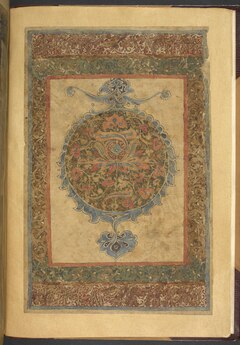|
Jeremiah 3
Jeremiah 3 is the third chapter of the Book of Jeremiah in the Hebrew Bible or the Old Testament of the Christian Bible. This book contains prophecies attributed to the prophet Jeremiah, and is one of the Books of the Prophets. Chapters 2 to 6 contain the earliest preaching of Jeremiah on the apostasy of Israel.[1] Verses 2:1-3:5 dramatize the ending of a "marriage" between Yahweh and Israel, whereas verses 3:6-4:2 describe "the aftermath of recrimination" and partial restoration.[2] TextThe original text of this chapter, as with the rest of the Book of Jeremiah, was written in Hebrew language. Since the division of the Bible into chapters and verses in the late medieval period, this chapter is divided into 25 verses. Textual witnessesSome early manuscripts containing the text of this chapter in Hebrew are of the Masoretic Text tradition, which includes the Codex Cairensis (895), the Petersburg Codex of the Prophets (916), Aleppo Codex (10th century), Codex Leningradensis (1008).[3] There is also a translation into Koine Greek known as the Septuagint, made in the last few centuries BCE. Extant ancient manuscripts of the Septuagint version include Codex Vaticanus (B; B; 4th century), Codex Sinaiticus (S; BHK: S; 4th century), Codex Alexandrinus (A; A; 5th century) and Codex Marchalianus (Q; Q; 6th century).[4] ParashotThe parashah sections listed here are based on the Aleppo Codex.[5] Jeremiah 3:1-5 is a part of the Second prophecy (Jeremiah 2:1-3:5), whereas Jeremiah 3:6-25 is a part of the Third prophecy (Jeremiah 3:6-6:30); both are in the section of Prophecies of Destruction (Jeremiah 1-25). {P}: open parashah; {S}: closed parashah.
StructureVerses 1–5 continue Jeremiah's first prophecy, commenced in chapter 2. Verses 6–18 may be considered as a separate prophecy, the first prophecy then resuming with verse 19.[6] Wages of apostasy (3:1–5)Verse 1
The part following "They say" refers to Deuteronomy 24:1–14 which forbids a man who divorced his wife to remarry her if she had married another man, even when she becomes a widow or is divorced by the second husband.[8] Verse 3
Jeremiah's thoughts are strongly connected with Deuteronomy 11:13–14:
The Septuagint text is completely different:
A call to repentance (3:6–25)Verse 12
The phrase "Return, backsliding" (שׁ֣וּבָה מְשֻׁבָ֤ה, shubah meshubah) is a play of two words from the same root shub ("to turn"), that the "backslider" ("turn away") is invited to "return" ("turn back") without getting the anger of Yahweh, because He is merciful.[12] Verse 23
The Masoretic text reads:
Transliteration: The repentance should start with the confession that the "hills" and "mountains" give false hope, but the salvation of Israel can only be found in Yahweh, as Israel's only God.[14] See also
Notes and references
Sources
External linksJewishChristianInformation related to Jeremiah 3 |
||||||||||||||||||

